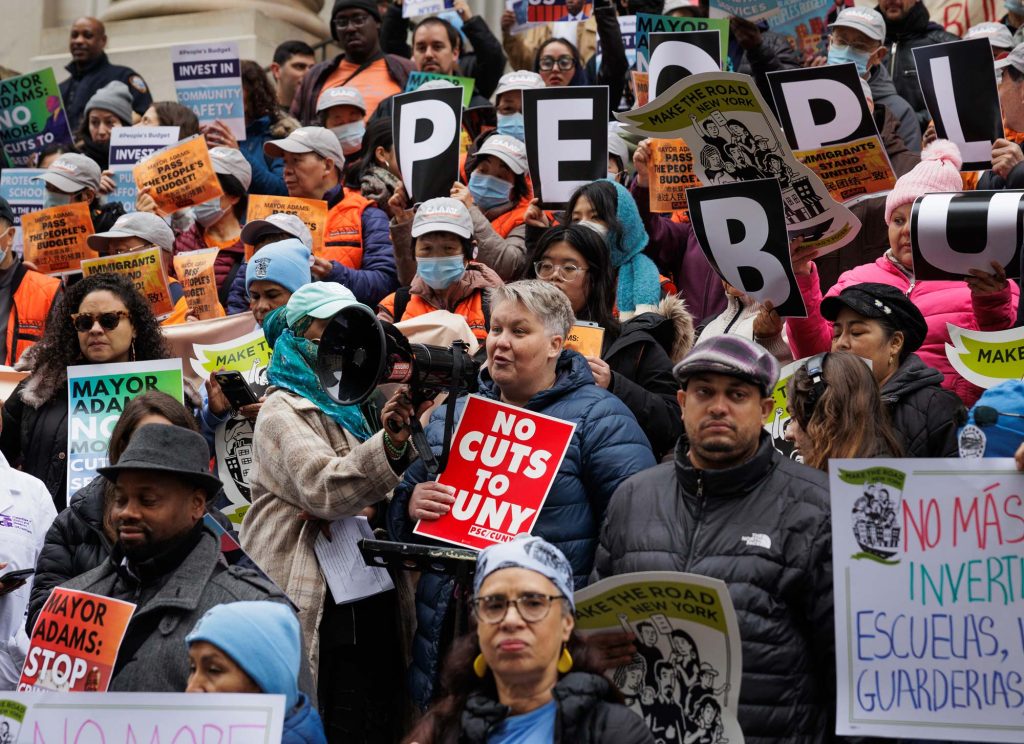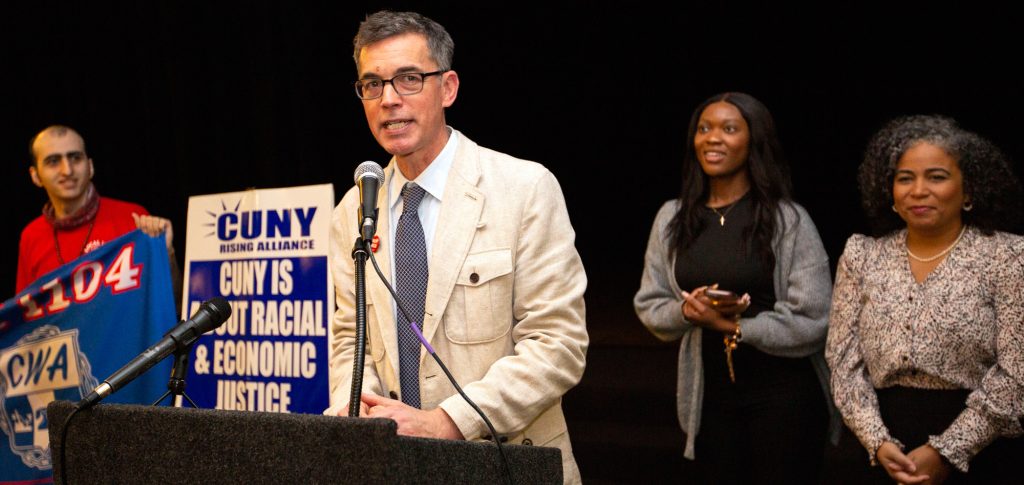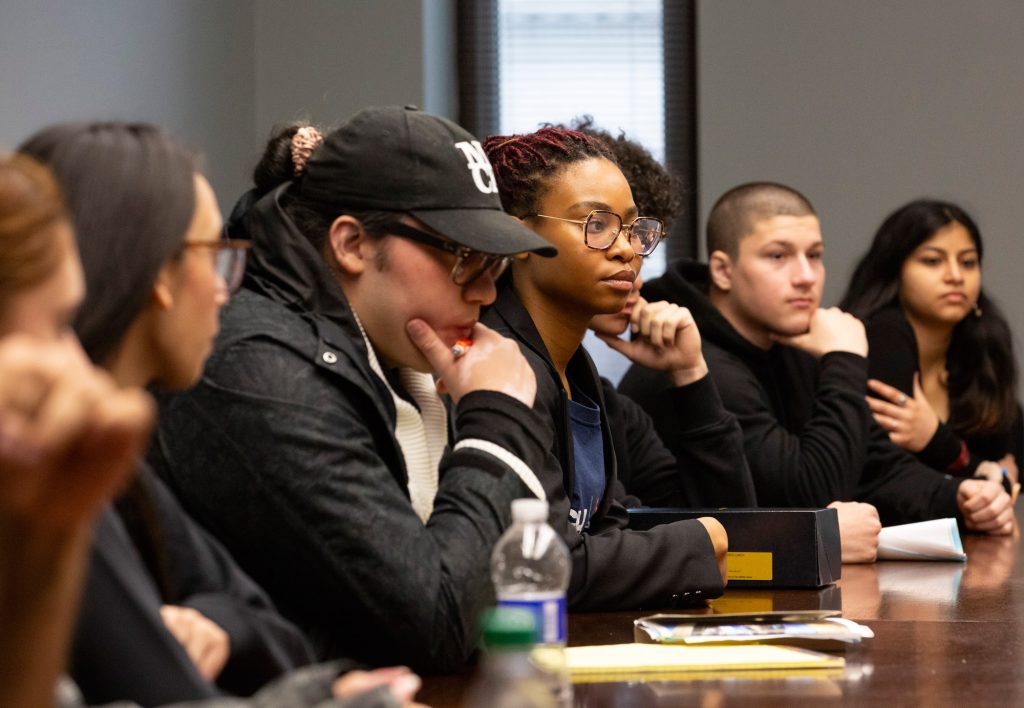
Jen Gaboury (center) addresses an anti-austerity rally in Manhattan. Photo credit: Paul Frangipane
As this newspaper went to press, the state legislature and Governor Kathy Hochul were in negotiations leading up to the April 1 deadline for a state budget agreement. As the campaign for state funding for CUNY winds down, the PSC is intensifying its campaign at the city level.
In February and March, the PSC, along with its allies in community groups, student organizations and in the labor movement, intensely lobbied in Albany for a transformative state investment in public higher education.
While the governor’s initial budget proposal included investments in SUNY and CUNY, advocates for both university systems are fighting for increased funding that would raise the number of full-time faculty and staff, increase services for students and repair infrastructure. Hundreds of PSC members and students descended on Albany on February 28 to rally and meet with state lawmakers.
INCREASED FUNDING
The Albany Times Union reported that Damien Andrade, a Brooklyn College student and the chair of the New York Public Interest Group’s board of directors, said, “We fight for a New Deal for public higher ed and quality education for all New Yorkers.”
The paper reported that the PSC-led coalition “called for more than $600 million in the upcoming state budget for senior college campuses,” noting that the governor’s “proposed executive budget includes an additional $100 million in new recurring operating funds for SUNY campuses and $107 million for CUNY campuses.”
The Times Union added, “Funding for community colleges would stay the same as last year under the proposed budget, with $416.7 million for SUNY campuses and $218 million for CUNY campuses. The advocates also called for changes to budget proposals that decrease funding for educational opportunity programs – which provide academic and financial support to disadvantaged students at SUNY, CUNY and private campuses – by $6 million from last year’s more than $190 million in funding.”
HISTORIC UNDERFUNDING

PSC President James Davis addresses activists in Albany. Photo credit: Patrick Dodson
Heather James, the union’s legislative representative, told Clarion that while CUNY fared well in the last budget agreement, there was still more work to be done to address historic underinvestment as well as the recent cuts CUNY made to nine so-called “campuses of concern.”
“Without further help [from the state] we’re going to be down faculty and staff, not up,” said James, an assistant professor of social sciences at Borough of Manhattan Community College. “That’s something not every legislator knows. We’ve been stressing this year that this has been a staffing crisis, it’s a retention crisis, it’s not an enrollment crisis.”
As this paper went to press, one-house budget bills were being printed in both chambers proposing additional annual operating aid and capital funds for CUNY above the governor’s executive budget: $67 million more in the assembly one-house bill and $75 million more in the senate one-house bill, both of which proposed $535 million in new capital funds for CUNY senior colleges. Now the struggle begins between the executive and legislative branches, with advocates including the PSC pressing for even more.
The city funding situation is far more dire – a budget deadline is set for this summer. City Comptroller Brad Lander said that the “the mayor’s preliminary budget cuts CUNY, libraries, cultural institutions and vital re-entry programs that keep New Yorkers safe, and it fails to address critical challenges facing our housing, sanitation and parks departments.”
A report from his office found that “over the past two years, the City has reduced its annual funding for CUNY’s community colleges by $95 million. Cuts will hit colleges unevenly; nine institutions unable to achieve budget targets began making midyear cuts ranging from eliminated programming, increased class sizes or further reductions in faculty and staff.”
While the mayor’s office has pushed for austerity, the PSC is working with allies in the City Council to push for more progressive funding for CUNY. Many lawmakers have already signaled their willingness to stand up to City Hall’s austerity. The council has also issued a report showing the City has adequate revenue to fund programs and services, including CUNY.
“The report shows the City is expected to see a significant improvement in revenue compared to what the mayor’s office had originally anticipated,” Spectrum News reported. “The report estimates $3.3 billion more in revenue for this fiscal year and the next one, which begins July 1. The new forecasts are a major difference from what the mayor’s office of management and budget reported in January, which put revenues for this fiscal year at $73 billion. The council is projecting it at $74.3 billion.”
PSC members joined elected officials and dozens of activists on March 6 to announce the “People’s Budget,” an agenda for funding public services including CUNY in this year’s city budget agreement.
CAMPUS EFFECTS

Students meet with state lawmakers. Photo credit: Patrick Dodson
At a rally near City Hall, Jen Gaboury, the PSC chapter chair at Hunter College, said that the city and state underfunding of CUNY had huge negative impacts on students, noting that the student-to-advisor ratio on many campuses was nearly 1 to 1,000; it should be closer to 1 to 150. “We shouldn’t be scrambling to hold on to what we have,” she said. “CUNY is being squeezed.”
The PSC has long argued that CUNY is underfunded and lacking key resources, especially when compared to peer institutions – crumbling buildings, bare-bones staffing, classrooms without enough desks. Carole Harris, the PSC chapter chair at City Tech, reflected on her own experience teaching at Rutgers University. The gulf between how these two university systems are treated is the reason why both the City and State need to step up and invest in CUNY, Harris said.
“When I compare the support that students, staff and faculty receive there to what students, staff and faculty receive at my college, I see we at City Tech live as second-class citizens,” she said. “Mayor Adams is a graduate of City Tech. Why does he forsake us? Governor Hochul must know in her heart that investing in public education is the gift that keeps on giving. Why doesn’t she act on that knowledge?”
Published: March 27, 2024

